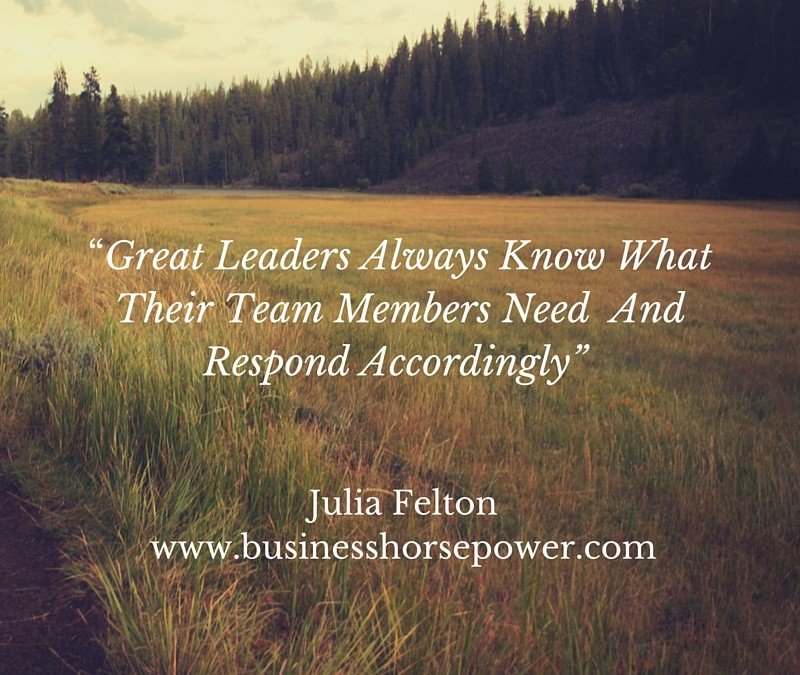
by Julia Felton | Apr 24, 2016
This week I have been reflecting on the fact that great leaders are masters at reading non-verbal communication and knowing exactly what their team members need, and what is going on for them, before they even ask for it. This is because great leaders are really grounded and present and tuned into their surroundings.
At this time of year my horses coats are molting and that makes them really itchy. The best solution for them is to roll around on the floor so they can give themselves a good scratch. Now two of my horses have been wearing rugs all winter so it is more difficult for them to get to scratch and roll. So it is no surprise that on a sunny day at the weekend, when I took their rugs off, they would want to roll. Knowing this I created a great experience for them where they could roll in a deep sandy area. They just loved it. A great example of knowing what your team need even before they ask for it.
As masters of being to read non-verbal communication clues, great leaders also recognise when team members are not “quite right” and functioning at their best. Great leaders read the energy of their team members to know something is amiss. We all have this ability. Just think about a time you went into a room and when you asked how everyone how they were, they replied fine. And yet you intuitively knew that something was up. You could do this as you were tuned into the energy in the room and intuitively something just didn’t feel right.
Just imagine the impact you can make on a team member when you acknowledge this fact and then take steps to help them. It really shows you care, and this simple act can go a long way to foster team engagement and motivation.
So today, please pay attention to what is happening with those around and seek to acknowledge what others need before they have to articulate it. This will bring untold benefits.
Have a great week and please share on the facebook group what happened for you.
Julia Felton (aka The Business Wrangler) is the founder of Business HorsePower. Business leaders, entrepreneurs and executives hire her to accelerate their business performance by harnessing the energy of their people to work more collaboratively together. By aligning purpose with actions the team achieves exponential results as everyone starts pulling in the same direction.
Julia believes that business is a force for good and through designing purpose-driven businesses that leverage the laws of nature, and the herd, you can create businesses founded on the principles of connection, collaboration and community that make a significant impact in the world.
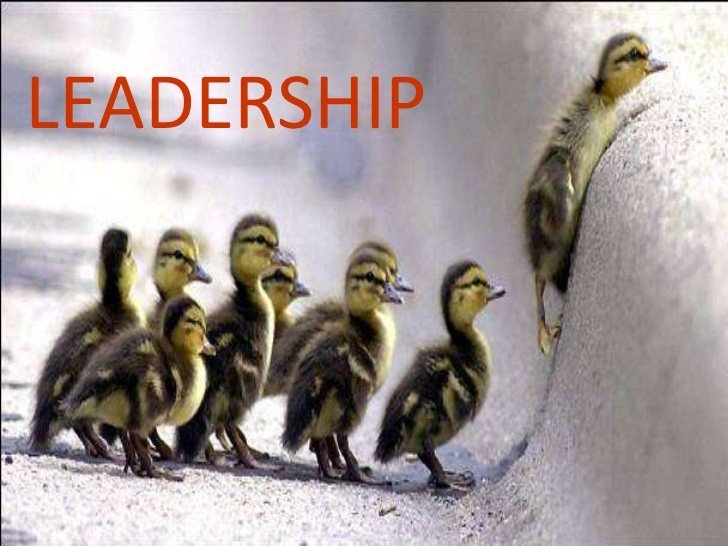
by Julia Felton | Apr 10, 2016
‘Before you are a leader success is all about growing yourself. When you become a leader, success is all about growing others.’ Jack Welch
A recent survey conducted by Emergentics International revealed that Leadership development is the number one priority of HR and organizational development leaders, with 25% of respondents putting it at the top of their priority list. With organizations needing to meet ever-higher financial goals and growth targets, the emphasis on people development provides a window into the way companies are seeing their ability to rise to the top.
The emphasis on talent development and management over competencies like innovation and tactical elements like metrics points to a realization that positive advancements in organizations must start with people. The second highest response for organizational priority was employee engagement, at 22%.
So what is leadership? The Oxford Paperback Dictionary defines a leader as ‘one whose example is followed’. Leadership is that elusive quality that companies are looking for and yet, in my opinion, is so often lacking in organisations. Given the multitude of companies offering leadership training and the circa £3billion spent on external training annually in the UK, how come our companies are not some of the best performing in the world? To my mind, leadership and management are too often confused. We expect managers to lead and yet leadership and management involve completely different skill sets. Indeed, the Peter Principal invariably plays out in organisations. The Peter Principal states that ‘people are promoted to the level of their incompetency’. This is why all too often people get promoted only to fail in their managerial role because what they really need are leadership skills.
Complete leadership starts with the vision and builds relationships with the people that share the vision and who will take on the task of achieving the vision. This differs from management which uses structures, rules and processes in order to control and predict results in a more stable situation. Frank S. Greene notes that ‘the success of management is seen in the industrial empires where people can be used interchangeably and as replaceable parts.’
In order for any business to be successful it needs strong leaders and particularly so in this age of globalisation because whilst an individual might be able to mask their lack of leadership skills in a small organisation, in my experience once they have to manage across multiple locations they will be found out. Great leadership involves developing a blend of vision, relationships and execution and as an organisation expands, the need for the leader to communicate that shared vision to a diverse set of people becomes paramount because unless the vision is shared, the organisation will never meet its goals. It will become like a ship bobbing up and down on the ocean with no clear direction of where it is heading and wonder why the business fails to move forwards.
Horses Always Ask – Who is Leading?
So how can Horse Assisted Coaching help people develop leadership skills? The answer lies in the fact that horses are always looking for a leader. As a prey animal, the horse always has to be aware of imminent danger or else he could end up as someone else’s lunch. This means that a horse always has to be alert to any danger in his surroundings and also be in a position to run away should that danger present itself. To ensure that the horse can survive being a prey animal it has evolved so that its natural behaviour and physiology can keep it as protected as possible. This is why horses have eyes on the side of their head, as it gives them nearly 360 degree vision to see any approaching danger. They are also acutely aware of any changes in their environment, as this could herald the onset of approaching danger. The sense of community and camaraderie they gain from living in herds also helps keep horses safe. I’m sure you’ve heard of the idiom ‘Safety in numbers’ – well, this is the premise that horses work from. The more of them that are together, the more eyes they have looking out for danger and so the safer they feel.
It is because of this desire to stay safe that a horse is always looking for a leader. Can you imagine living by yourself, never being able to rest and relax for fear of being attacked and eaten? This is a tiring place to be and the reason why a horse is willing to let us take up the leadership role with them. However, and this is a really big thing, we must prove to be a leader who can be trusted and who knows what they are doing. If we have no clarity or certainty and don’t evoke a sense of trust from the horse then he will not let us lead him and he will take over the leadership position. You see, unlike people who might be quite polite when their boss is not being a clear, decisive leader, a horse has no option but to act, his life depends on it, whereas in a business we continue to tolerate poor leadership until such time that the leader is removed from that position – ironically often promoted to another position.
Different from humans, horses don’t follow blindly, yet they are looking to be led. They cannot be coerced or influenced, they choose to follow. Horses have survived for thousands of years due to their ability to get along with, and depend upon, one another. They test each other to establish their position within the herd, deferring only to other horses they feel will keep them safe. In a world in which money, control and status are non-existent, horse leaders respond immediately to the thoughts, feelings and sometimes hidden agendas of those around them, and communicate with authority, purpose, authenticity and confidence – all without ‘saying’ a single word. Like some employees, horses can either be willing participants or resentful ‘herd members’, making them ideal partners for teaching self-leadership and teamwork.
Want to learn more about how horses can help you make systemic leadership changes in your organisation, then give us a call or connect with us at connect@businesshorsepower.com
Julia Felton (aka The Business Wrangler) is the founder of Business HorsePower. Business leaders, entrepreneurs and executives hire her to accelerate their business performance by harnessing the energy of their people to work more collaboratively together. By aligning purpose with actions the team achieves exponential results as everyone starts pulling in the same direction.
Julia believes that business is a force for good and through designing purpose-driven businesses that leverage the laws of nature, and the herd, you can create businesses founded on the principles of connection, collaboration and community that make a significant impact in the world.

by Julia Felton | Apr 6, 2016
This week I began an 11 day Fat Loss Challenge with one of my former mentors John Assaraf. I love his work about the neuro-science of business and how the brain impacts our success. The great news is that you can re-programme your brain through a series of entrainment exercises and that is what I am doing with my eating patterns.
I met and then mentored with John back in 2009 when I was living in California and his programme “Having It All” was amazing and transformed my life. I’ll always remember his wise words about how to change anything in your life when he said “Inch By Inch It’s a Cinch”.
You see often when we seek to change habits or achieve goals we often think we have to do it all right now. We have become such an instant gratification society that we have begun to fail to appreciate all the small things around us. And yet it is all those small actions that ultimately help us achieve our goals and dreams.
It is dogged determination and persistence day in day out that effects change. It is the daily decisions that I make about exercise and chocolate that will affect how successful I am on this Fat Loss Challenge, after all I know I can’t lose 6kg overnight!!!
As well as consistent action the other thing to do when setting goals is to make sure they inspire you. John bans the word “diet” as that implies lack and none of us want that. The language we use is so important in helping help us stay motivated and focused, so rather than losing weight John talks about releasing weight. There is something in the language that makes me feel that I am making the choice to do this rather than being forced.
So what small action will you take today to move you towards your goals and dreams – maybe it is reaching out to client, having a courageous conversation with your boss or spouse or in my case exercising and making the choice to eat healthier food.
Julia Felton (aka The Business Wrangler) is the founder of Business HorsePower. Business leaders, entrepreneurs and executives hire her to accelerate their business performance by harnessing the energy of their people to work more collaboratively together. By aligning purpose with actions the team achieves exponential results as everyone starts pulling in the same direction.
Julia believes that business is a force for good and through designing purpose-driven businesses that leverage the laws of nature, and the herd, you can create businesses founded on the principles of connection, collaboration and community that make a significant impact in the world.
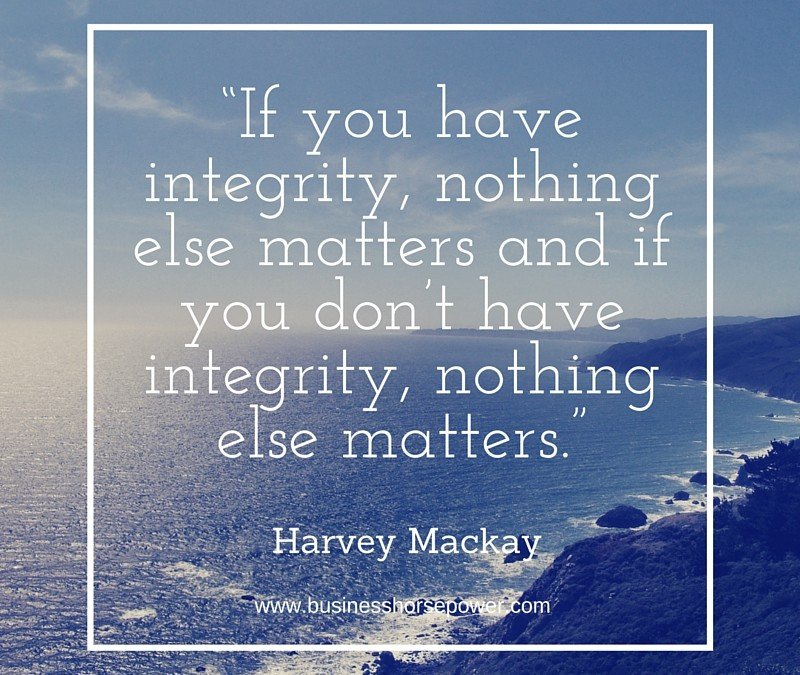
by Julia Felton | Mar 30, 2016
This week I have been thinking a lot about integrity. About what it is and why increasingly I feel that this value is lacking in business. So what is integrity? The dictionary definition is “the quality of being honest and having strong moral principles” and “the state of being whole and undivided”, so how come I am not experiencing this right now? And it seems I am not alone, many of my friends have been commenting on this too recently.
To lead effectively good leaders must demonstrate the right virtues They must demonstrate honesty, humility, authenticity, credibility, courage and accountability. But the most important leadership virtue is integrity. In their book, “The Corporate Mystic Dr. Gay Hendricks and Dr. Kate Ludeman, define integrity the following way, “The mastery of integrity comes down to three things: being authentic with yourself, being authentic with others, and doing the things you have said you would do.”
And perhaps that is the challenge. So often I come across people not walking their talk. They are not being authentic and not demonstrating consistent, honest behaviour. They are misaligned and in-congruent and maybe that is why I struggle to connect with them.
Leadership is influence, but we need leaders who can be trusted and act with integrity. Integrity is a critical factor in the performance of executives and managers. If you are in a leadership role, you have the power to influence people in your organization. When relationships in your organization are built on trust and integrity, you can be sure that your team will be able to reach higher performance. As Stephen R. Covey says, “Personal integrity generates trust and is the basis of many different kinds of deposits.” Lack of integrity can undermine many relationships.
Just as lack of integrity erodes relationships so acting in integrity builds relationships, and in my experience can be the defining difference between business success and failure
So today’s thought is what relationships are you undermining and putting in jeopardy by not being authentic and in integrity?
Julia Felton (aka The Business Wrangler) is the founder of Business HorsePower. Business leaders, entrepreneurs and executives hire her to accelerate their business performance by harnessing the energy of their people to work more collaboratively together. By aligning purpose with actions the team achieves exponential results as everyone starts pulling in the same direction.
Julia believes that business is a force for good and through designing purpose-driven businesses that leverage the laws of nature, and the herd, you can create businesses founded on the principles of connection, collaboration and community that make a significant impact in the world.
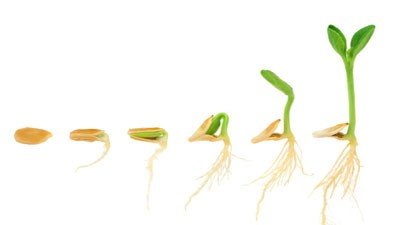
by Julia Felton | Mar 27, 2016
This blog is inspired by the work of Jim Rohn and the fact that Spring, the season of sowing and planting has just begun. As a Creator type (Talent Dynamics) it is my favourite time of year. It is the time when I get to explore new ideas and strategise (and prioritise) for the upcoming year. Now I know most people say do this in January but I love to work with the seasons of the year so Spring is my time for plating and initiating all my new projects for the year.
As I’ve been reflecting on what projects (seeds) to plant for this I have been reminded of the first of the basic law of leadership: Whatever you sow, you reap.
In other words, in order to reap rewards (i.e. get success), you must first sow. You must take action and put your ideas into practice otherwise you will never be able to reap. Reaping is reserved for those who sow, who plant. To deserve the harvest, you must plant the seed. Take care of it in the summer. Carefully harvest it and then do wise things with the harvest.
Now, there is a second part to the law which states: If you sow good, you reap good. If you sow bad, you reap bad. This means you cannot sow badly and then hope for good. You can’t plant weeds and hope for flowers.
Here’s something else about the law of sowing and reaping. You don’t reap only what you sow. That’s important to understand. You reap much more than what you sow. If you just reaped what you sow, what’s the exercise for?
It is also important to understand that the law works in both positive and negative, so be careful what you sow. An old prophet once said, “If you sow the wind, you don’t reap wind, you reap a whirlwind.” Therefore you’ve got to be careful sowing the wind, because it might just come back as a whirlwind. That’s on the negative side. But now it also works on the positive side. If you plant a cup of corn, how much do you get back—a cup? No, a bushel for the cup. You get back much more than what you plant. That’s the reason for planting—for the increase.
The final key to the law of sowing and reaping is:. Sometimes it doesn’t work at all. Everybody has to understand. The farmer plants the crop in the spring and takes care of it all summer. He’s an honorable man. Loves his family and is a decent citizen. But the day before he sends the combine harvesters into the field, a hailstorm comes along and beats his crop into the ground. And it’s gone. It’s lost.
So this time it didn’t work. Now what must the farmer do? He’s got to decide whether to do it again or not. “Shall we take another chance the next spring?” I would advise him to do so even though he lost everything in the last harvest because more often than not, you’ll have a harvest if you plant in the spring. There’s no guarantee, but it’s pretty good odds.
And it’s the same in business. We need to carefully select what we want to sow and then we have to nurture the seed (project, programme etc) until it is the right time to harvest. If we pull up the seeds too early and give up on projects before they have had time to get established then we will never reap the benefits of the harvest. And this is what I see a lot of clients doing. They give up on their dreams just before the harvest period. And of course like the analogy goes, even despite all our good work the crop (business or project) might still fail. And what do you do then. I suggest be like the farmer, dust yourself off and have another go. After all the law of probability will probably come into play meaning that the likelihood of failure will be diminished, assuming of course that you learn from your mistakes and don’t replicate them.
Julia Felton (aka The Business Wrangler) is the founder of Business HorsePower. Business leaders, entrepreneurs and executives hire her to accelerate their business performance by harnessing the energy of their people to work more collaboratively together. By aligning purpose with actions the team achieves exponential results as everyone starts pulling in the same direction.
Julia believes that business is a force for good and through designing purpose-driven businesses that leverage the laws of nature, and the herd, you can create businesses founded on the principles of connection, collaboration and community that make a significant impact in the world.

by Julia Felton | Mar 16, 2016
Today’s Wednesday Wisdom is inspired by the lions I saw in the African bush. Did you know that on average a pride of lions have only a 30% success rate every time they go for a kill? Do you think they complain and blame each other when they aren’t successful. No. They just try again.
What I have observed in business is that sometimes we don’t try. The fear of failure leaves us stuck and in paralysis. And yet often the thing that we crave is just round the corner, and if we dared maybe we might just be successful. Throughout my childhood I was typically reprimanded if I got things wrong so it is no wonder that as a business owner I have been afraid of failure and getting things wrong. Maybe you can relate to that. And yet the truth is we can never learn and develop if we don’t try new things. Sure we might fail at some of these new ventures, but so long as we have tried and take on board the learning there is no such thing as failure.
My mentor Roger Hamilton once shared this with me “Learning is earning with the L-plates on it” and it is so true. We can only learn by trying new things and as a business owner there is also the opportunity to be paid to do this. So if you are experimenting with something new in your business you can get paid whilst also learning at the same time.
For me only real source of failure in business (and in life) is if you fail to learn from your actions. Being a life long learner is imperative if you are to grow and stay successful because there is one certainty in business and that is change. The world is moving at lightening pace and unless we are open to learn new things then we will never stay competitive in business.
For the lions, and especially the young lion cubs, they learn to hunt and each time they are unsuccessful they keep trying again. After all their survival depends on mastering this skill. At the outset they are beginners but with continued practice they learn to hone their skills until they become very accomplished.
So my question today is what can you do that will develop your skills and provide you with learning opportunities, regardless of whether you succeed or fail. I’d love to hear from you.
Julia Felton (aka The Business Wrangler) is the founder of Business HorsePower. Business leaders, entrepreneurs and executives hire her to accelerate their business performance by harnessing the energy of their people to work more collaboratively together. By aligning purpose with actions the team achieves exponential results as everyone starts pulling in the same direction.
Julia believes that business is a force for good and through designing purpose-driven businesses that leverage the laws of nature, and the herd, you can create businesses founded on the principles of connection, collaboration and community that make a significant impact in the world.
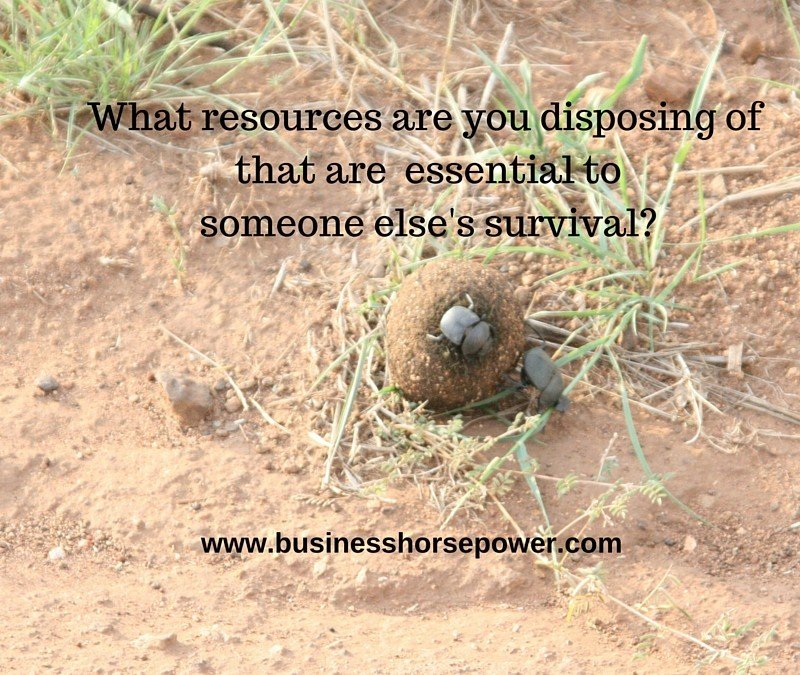
by Julia Felton | Mar 1, 2016
This weeks Wednesday Wisdom is all about the power of inter-dependence and how what one persons discards can be another persons treasure.
Out in the African bush I have seen all the Big Five – Cape Buffalo, Lion, Elephant, Rhino and Leopard – which has been amazing. What I love about the African bush – and in fact all nature – is that fact that every works in harmony. Nature is a true ecosystem where everything is inter-dependent on everything else. Consequently there is no wasted time, energy or money as everything is connected. This is the key theme of my new book The Alchemy of Change: The Key To The Future Lies In The Past
One of the interesting facts we learnt was that an elephant eats up to 300 kg per day, which means each elephant generates about 100kg of manure each and every day!!! That’s a lot of shit. And yet the elephant’s waste products are a source of sustenance for the Dung Beetle. Dung beetles collect up the elephant dung into a ball and then roll it to a destination where they bury it. They then climb into the ball of dung with their mate, reproduce and then the dung beetle lavae are born inside.
Just imagine what would happen if the dung beetles went on strike. The bush would become covered in elephant dung and the dung beetles would eventually die out but also all the grasslands that the dung is deposited on would wither away. This is such a classic example of how all the species within the bush are inter-dependent on each other for their survival.
And it’s the same in business too. Business is an ecosystem where everyone’s actions impact each other. And also one man’s trash is another man’s treasure.
What items are you discarding that could add real value to someone else? I’d be curious to hear.
Julia Felton (aka The Business Wrangler) is the founder of Business HorsePower. Business leaders, entrepreneurs and executives hire her to accelerate their business performance by harnessing the energy of their people to work more collaboratively together. By aligning purpose with actions the team achieves exponential results as everyone starts pulling in the same direction.
Julia believes that business is a force for good and through designing purpose-driven businesses that leverage the laws of nature, and the herd, you can create businesses founded on the principles of connection, collaboration and community that make a significant impact in the world.
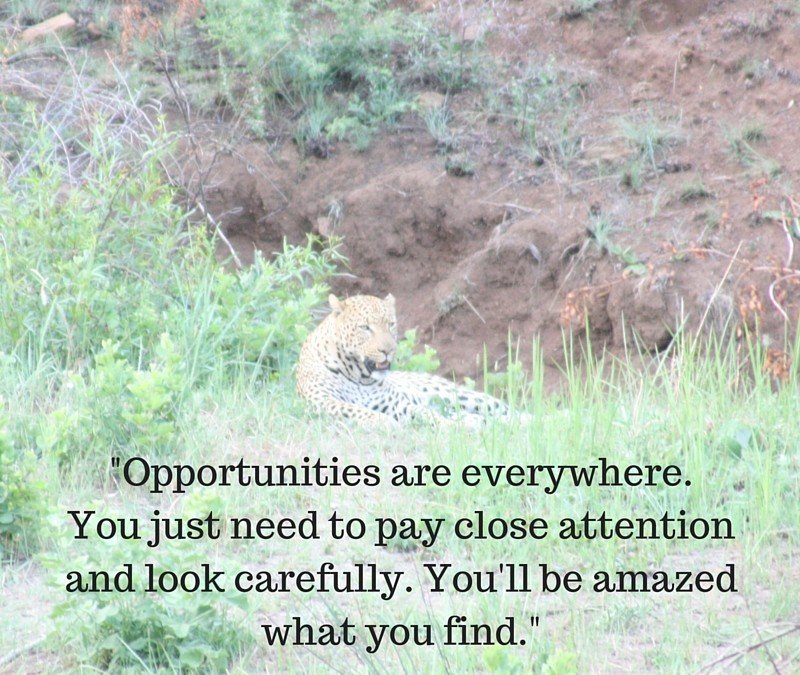
by Julia Felton | Feb 17, 2016
I’m sending you this weeks Wednesday Wisdom from the heart of the African Bush where I am co-running some events for Entrepreneurs Institute. Apologies for the delay but internet signal here is limited. This week’s insight is all about Opportunities because Opportunities are everywhere if we are just present and open to them.
I’ve now been in Africa for three days and done four game drives. What I have realised is that as each day goes by I become more grounded, present and aware. On the first day my focus was so narrow that I could barely see any animals, but as each day passes my periphery vision improves and now I’m starting to see animals that the Ranger hasn’t seen yet. Also on the first game drive I could only see big animals but this morning I started to notice all the butterflies and birds flying around.
You see the animals (aka opportunities) are all around us you just have to open your eyes to see them. Sometimes we are so focused on the big win, or the thing right in front of our nose, that we fail to see other opportunities lurking in the background. That is exactly what happened last night. We were so excited to see a Waterbuck, as we hadn’t seen one before, that we nearly missed seeing this leopard that was lying down in the undergrowth.
I wonder what opportunities are surrounding you that you are failing to see? So for today just slow down and stop, and really look around you. You might be amazed at what you are missing that is right beside you.
Julia Felton (aka The Business Wrangler) is the founder of Business HorsePower. Business leaders, entrepreneurs and executives hire her to accelerate their business performance by harnessing the energy of their people to work more collaboratively together. By aligning purpose with actions the team achieves exponential results as everyone starts pulling in the same direction.
Julia believes that business is a force for good and through designing purpose-driven businesses that leverage the laws of nature, and the herd, you can create businesses founded on the principles of connection, collaboration and community that make a significant impact in the world.
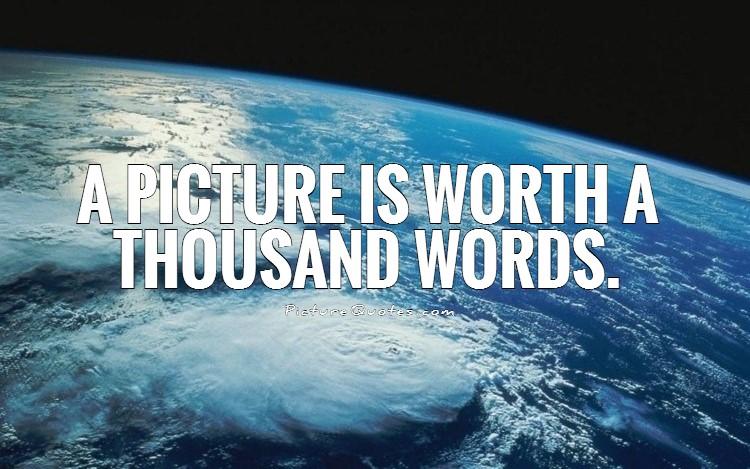
by Julia Felton | Feb 11, 2016
The adage goes that “a picture is worth a thousand words”, so therefore I’m curious to know what you think about this picture. What message do you think I was being sent when it arrived in my inbox? And how do you think I reacted?

We often totally under-estimate the power of non-verbal communication in our society and yet non-verbal communication is an essential component of everyday life. We can convey a simple or complex message very succinctly with how we show up.
If we are feeling bored and unenthusiastic at work our body posture will probably express this with folded arms, rounded shoulders and generally looking glum and sad. Contrast this with a team member who is happy and in flow enjoying their job. They probably have a spring in their step, are literally walking on air and have a happy countenance.
How we BE at work and in life shapes how people interact with us and therefore the experiences we have. Sure words are important, but only up to a point as research shows that our body language and tonality have a much greater impact on the impression we make than anything else.
So how do you think I responded when I received this. Well of course I laughed and immediately saw the funny side of how my actions were stopping one of my colleagues getting on with her work. What might have become a heated conversation – her chasing me for something I hadn’t completed – got deflected with with one simple image.
So how can you use non-verbal communication to convey your message in a fun and innovative way?. I’d love to hear what you are doing.
And of course if you want to learn non-verbal communication from horses, who are masters at this, then look out for my Art of Communication workshop that up soon. You can find all the details here.
Have an inspired rest of the week.
Julia Felton (aka The Business Wrangler) is the founder of Business HorsePower. Business leaders, entrepreneurs and executives hire her to accelerate their business performance by harnessing the energy of their people to work more collaboratively together. By aligning purpose with actions the team achieves exponential results as everyone starts pulling in the same direction.
Julia believes that business is a force for good and through designing purpose-driven businesses that leverage the laws of nature, and the herd, you can create businesses founded on the principles of connection, collaboration and community that make a significant impact in the world.
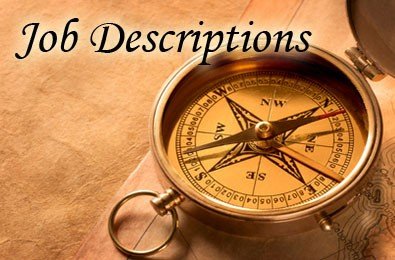
by Julia Felton | Feb 9, 2016
What if I told there are 8 different personality types and each profile has specific strengths they can bring to your business? Would you put people in the right roles for their profile.? I bet you would because that would bring massive efficiencies in the business and make productivity and profitability increase.
So why is it that time and time again I come across people working in the wrong roles – ones that don’t utilize their strengths – or where they can’t add real value to the team?
One of the reasons for this is that in my opinion most job descriptions are fundamentally flawed. We want team members to undertake a myriad of tasks that are diametrically opposed and require very differing skills sets.
Talent Dynamics is a business development tool that identifies that within everyone there are four different frequencies and each person has a preference for one type of frequency. Maybe you are a:
- Dynamo: energized, dynamic and great at getting things started. Getting things finished can be a challenge
- Blaze: passionate, outgoing, great at networking and meeting new people. Easily distracted by the task at hand
- Tempo: compassionate, great team player and reliable at getting things done with the team. Other seeks direction from others
- Steel: orderly, systems orientated with a good eye for detail, strong at completing. Can find it difficult to start new things.
Given our redisposition towards one of these frequencies can you now see how a job description that requires someone to create the strategy and have a big picture perspective (dynamo energy) will struggle with customer follow up and attention to detail (much more a tempo/steel activity).
Let me give you an example of a job description for a secretary that I have just pulled from the web. Look at all the different types of frequencies that the role requires.
- devising and maintaining office systems; (dynamo)
- booking rooms and conference facilities; (tempo)
- using content management systems to maintain and update websites and internal databases; (steel)
- attending meetings, taking minutes and keeping notes; (tempo)
- managing and maintaining budgets, as well as invoicing; (steel)
- liaising with staff in other departments and with external contacts; (blaze)
- liaising with colleagues and external contacts to book travel and accommodation; (tempo)
- organising and storing paperwork, documents and computer-based information; (dynamo)
- recruiting, training and supervising junior staff and delegating work as required; (blaze)
- manipulating statistical data; (steel)
Wow, not only is that a lot to cover but it requires someone with super human powers as it is simply impossible for someone to have strengths in all these areas.
When we ask team members to work across the different frequencies it is challenging for them and they certainly don’t deliver the most value to the business. Often they end up stressed doing the parts of the role that don’t resonate with them, or in the worst cases they don’t do this part of the role at all.
I remember when I was leading teams in the corporate world how at every staff appraisal I used to get team members to focus on developing the areas they were weakest at. This was before I had been exposed to Talent Dynamics. I now realize that if my data manager (who had a lot of Blaze energy) had been allowed to shine by engaging and motivating my team members how much more valuable she would have been to the team than left analyzing data which is a very steel type activity (and one she hated and to be fair wasn’t that great at).
And with my own role I loved it to begin with creating a new department and designing a new innovative product. My dynamo energy was ignited and I was on fire creating a pioneering solution for the hospitality industry. Contrast that with later in my career when I had grown the business to be the global market leader in its niche. My role changed and instead of creating new solutions I was charged with managing the team – a real blaze role – and one that I did not relish. My value to the company diminished as I was not fulfilling my potential since I wasn’t doing what I was naturally gifted to do.
I hope you now see how often we design roles for people that they can never really succeed at. A better approach would be to ensure that you have a number of different roles in the team that cover all the different frequencies. And ensure that people are working in the roles that best resonate with their natural strengths.
Also, beware of always hiring people like you as you will just get more of the same and the tasks that you don’t like doing still won’t get done as they are not the natural skill sets of the person you hired. This is exactly what I experienced recently working with a client in the media sector. All the people in the team were super creative types with lots of dynamo and blaze energy and there was very little steel and temp energy in the group. The result was that the team weren’t good at managing the finances of the group or mastering follow up.
Just like a wheel of life there needs to be a balance of these different energies in your business. Have a look at your business now and the roles that you have identified for your team members. Do they need refining to better use each individuals skills?
To find out how you can use Talent Dynamics to help you rewrite your job descriptions or help you identify the roles that speak to your natural strengths please feel free to connect with me at Julia@businesshorsepower.com.
Julia Felton (aka The Business Wrangler) is the founder of Business HorsePower. Business leaders, entrepreneurs and executives hire her to accelerate their business performance by harnessing the energy of their people to work more collaboratively together. By aligning purpose with actions the team achieves exponential results as everyone starts pulling in the same direction.
Julia believes that business is a force for good and through designing purpose-driven businesses that leverage the laws of nature, and the herd, you can create businesses founded on the principles of connection, collaboration and community that make a significant impact in the world.

















